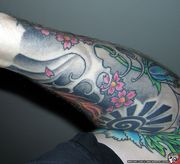Cherry blossom
Jump to navigation
Jump to search
The image of the cherry blossom is very prevalent in classical Japanese tattooing and has a very definite symbolic meaning. In The Japanese Tattoo authors Richie and Buruma write:
- The cherry blossom is famous in Japanese poetry, in prose, and in most of the graphic arts. It has become the symbol for all that is transient and evanescent in life. The blossoms appear in all of their beauty for only a day or two. Then they are scattered by the winds and rains. This loveliness lasts for but so short a time: how like life itself, where all things are ephemeral. It is said that the samurai adopted the cherry blossom as a personal insignia, indicating that they might well die in battle the next day.
- The cherry blossom as a symbol thus has quasi-philosophical associations . . . of the same order as those attributed to, for example, the red rose in Western tattooing. There the message is undying love, eternal fidelity, and a degree of transcendence over mundane life. In Japan the cherry blossom implies a different kind of transcendence from that in the West. One acknowledges natural forces and quietly celebrates one's own evanescent qualities. The implications for a man wearing the intricate cherry-blossom pattern are that he is in accord with the nature of things, sad though this nature may be; that his own flesh is as fragile as the petals of the blossom.
The cherry blossom continues to be a popular image in Western interpretations of Japanese style tattooing, often seen gracefully floating intact or with the blossom's petals scattered through wind or waves that form the background behind larger figurative images that comprise the tattoo.
Reference
- Richie, Donald and Ian Buruma,The Japanese Tattoo (John Weatherhill, Inc., New York & Tokyo, 1980)
